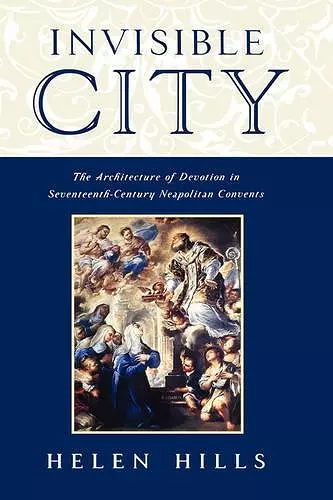Invisible City
The Architecture of Devotion in Seventeenth Century Neapolitan Convents
Format:Hardback
Publisher:Oxford University Press Inc
Published:12th Feb '04
Currently unavailable, and unfortunately no date known when it will be back

More than any other European city, Baroque Naples was dominated by convents. Behind their imposing facades and highly decorated churches, the convents of Naples housed the daughters of the city's most exclusive families, women who, despite their cloistered existence, were formidable players in the city's power structure. Invisible City vividly portrays the religious world of seventeenth-century Naples, a city of familial and internecine rivalries, of religious devotion and intense urban politics, of towering structures built to house the virgin daughters of the aristocracy. Helen Hills demonstrates how the architecture of the convents and the nuns' bodies they housed existed both in parallel and in opposition to one another. She discusses these women as subjects of enclosure, as religious women, and as art patrons, but also as powerful agents whose influence extended beyond the convent walls. Though often ensconced in convents owing to their families' economic circumstances, many of these young women were able to extend their influence as a result of the role convents played both in urban life and in art patronage. The convents were rich and powerful organizations, riven with feuds and prey to the ambitions of viceregal and elite groups, which their thick walls could not exclude. Even today, Neapolitan convents figure prominently in the city's fabric. In analyzing the architecture of these august institutions, Helen Hills skillfully reads conventual architecture as a metaphor for the body of the aristocratic virgin nun, mapping out the dialectic between flesh and stone.
Hills' extraordinary study is a nuanced and innovative incarnation of the secular city from its sacred recesses that should have broad appeal and wide-ranging influence. Invisible City is a brilliant, stunning book. * John Marino *
... a fascinating study of the foundation and development of convent life and architecture in 17th century Naples. * The Art Newspaper *
Helen Hills's Invisible City illuminates the rich and introverted world of seventeenth-century Neapolitan convents. In this ground-breaking study, Professor Hills brings early modern Naples to life. Her sensitive reading of architecture restores to the nuns their own voice and reveals the complex intersection of social class, gender, and urban politics. Helen Hills demonstrates that, as institutional patrons, the aristocratic women in the conventual communities of Naples were by no means subservient to a dominant religious patriarchy, but boldly asserted their own distinctive social, spiritual and aesthetic values. In the process, they contributed in no small measure to shaping one of the pre-eminent urban centers of seventeenth- and eighteenth-century Europe. * John Pinto, Princeton University *
Professor Hills's book is outstanding for its richly nuanced examination of the relation between architecture and gendered identity in Neapolitan convents. Demonstrating how convents formed an integral part of the spiritual, political, economic, and urban ambience of Naples, she makes an important contribution to our understanding of female monasticism and its social functions. * Marilyn Dunn, Loyola University Chicago *
Invisible City examines the social and moral impulses that put nuns into Neapolitan convents and the buildings that housed them, presenting them as intertwined components of a culture of aristocratic virginity. Massively researched and bristling with ideas expressed in vigorous, vivid prose, Helen Hills's brilliant book explores the paradox that, invisible in their unworldly cloisters, nuns built visually imposing vantage points for surveying the family palaces and the secular city that they had abandoned physically but in which they retained powerful cultural influence. * Stanley Chojnacki, University of North Carolina at Chapel Hill *
- Winner of Society for the Study of Early Modern Women Book Prize.
ISBN: 9780195117745
Dimensions: 160mm x 234mm x 28mm
Weight: 596g
320 pages